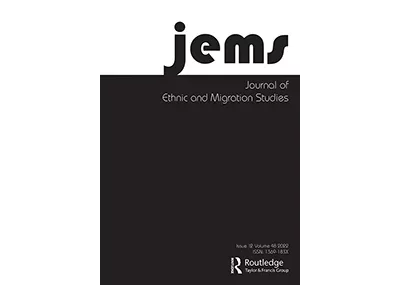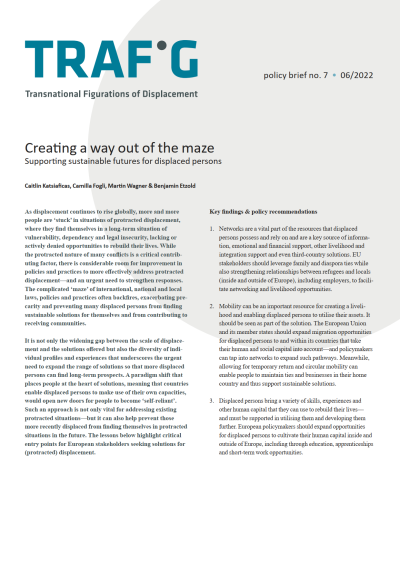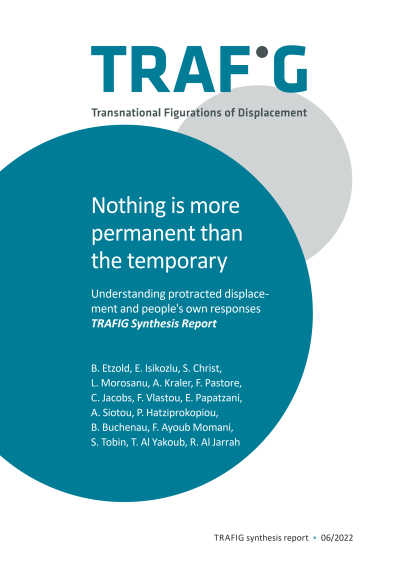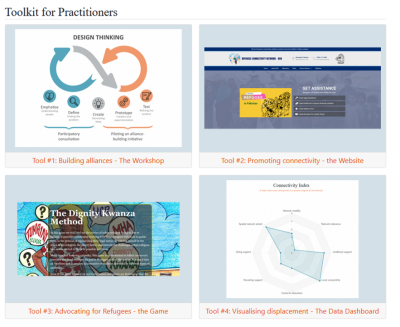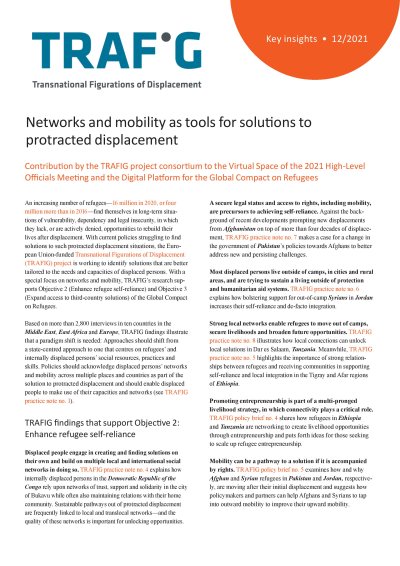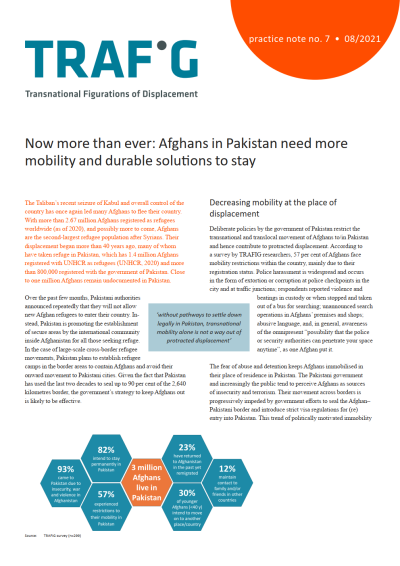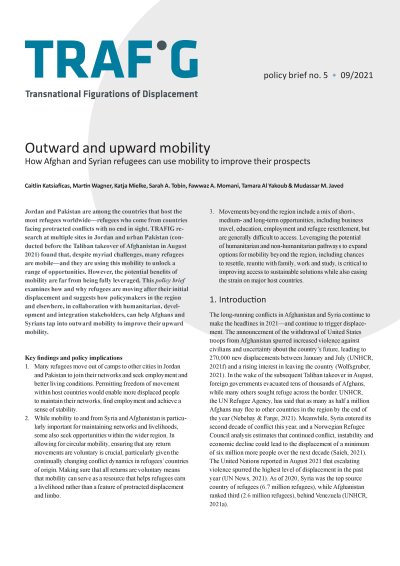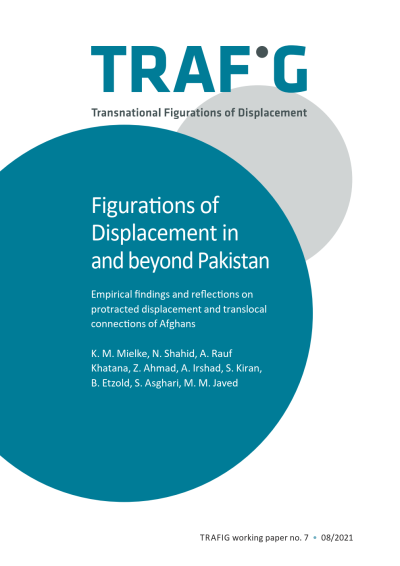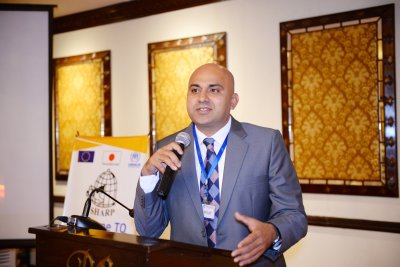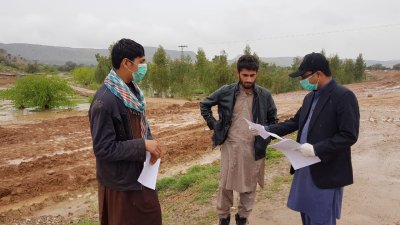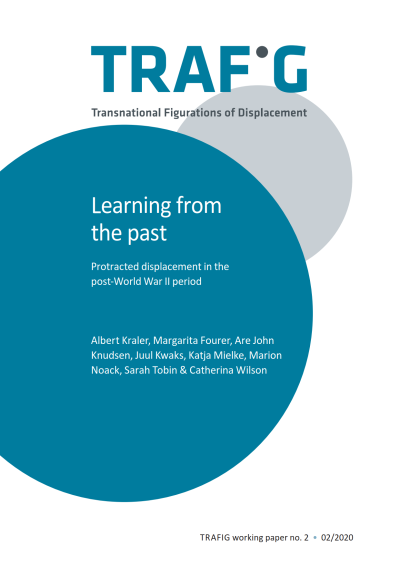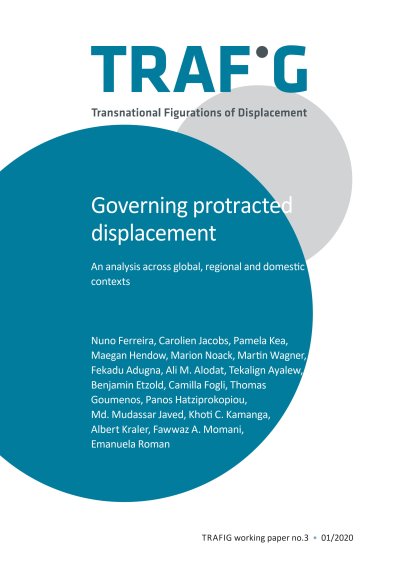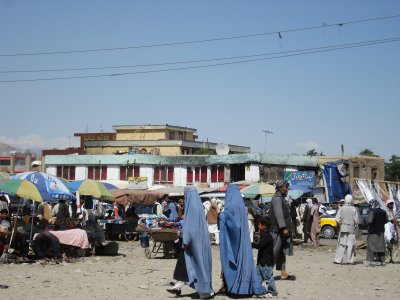Pakistan
In Pakistan, SHARP (Society for Human Rights & Prisoners’ Aid) and BICC (Bonn International Centre of Conflict Studies) looked into the situation of displaced Afghans, their livelihoods and networks across the country. More than 400 people participated in their study.
Special Issue in JEMS
Unsettling Protracted Displacement: Connectivity and Mobility beyond Limbo
Key results and reflections from the TRAFIG project have just been published in a special issue in the Journal of Ethnic and Migration Studies (JEMS).
The 9 contributions present novel insights of empirical research in African, Asian and European countries on the role of connectivity and mobility in the lives of displaced people, they critically engage with policies, legal frameworks and structures that keep displaced people in an ongoing state of limbo, they reflect upon the concept of protracted displacement and seek to advance its understanding, and they employ a figurational approach in their analysis.
All 9 articles are freely accessible via the publishers website: Read more
1 Introduction: Unsettling Protr
...TRAFIG policy brief no. 7
Creating a way out of the maze: Supporting sustainable futures for displaced persons
As displacement continues to rise globally, more and more people are ‘stuck’ in situations of protracted displacement, where they find themselves in a long-term situation of vulnerability, dependency and legal insecurity, lacking or actively denied opportunities to rebuild their lives. Drawing lessons from more than 3 years of research, this policy brief highlights critical entry points for European stakeholders seeking solutions for (protracted) displacement. Read more
TRAFIG Synthesis report
'Nothing is more permanent than the temporary' – Understanding protracted displacement and people's own responses
Final report sums up findings of 3 1/2 years of TRAFIG research.
Across the world, 16 million refugees and an unknown number of internally displaced persons (IDPs) experience long-lasting conditions of economic precarity, marginalization, rightlessness and future uncertainty. They live under conditions of protracted displacement. Policy solutions often fail to recognise displaced people’s needs and limit rather than widen the range of available solutions.
This report brings together the central findings of the TRAFIG project’s empirical study in the Democratic Republic of the Congo (DRC), Ethiopia, Tanzania, Jordan, Pakistan, Greece, Italy and Germany. We... Read more
Toolkit for Practitioners: Building Webs of Connections
This toolkit brings together practical outputs on solutions to protracted displacement.
Practitioners can promote or support displaced people's connectivity. Helping to build a web of connections allows displaced people to move ahead in life and to belong to others.
The toolkit entails 4 examples from our work:
Tool #1: Building alliances - The Workshop
Tool #2: Promoting connectivity - the Website
Tool #3: Advocating for Refugees - the Game
Tool #4: Visualising displacement - The Data Dashboard
Learn more about these tools, how we developed them and used them in our work. Read more
Networks and mobility as tools for solutions to protracted displacement
Contribution by the TRAFIG project consortium to the Virtual Space of the 2021 High-Level Officials Meeting and the Digital Platform for the Global Compact on Refugees
An increasing number of refugees – 16 million in 2020, or 4 million more than in 2016 – find themselves in long-term situations of vulnerability, dependency and legal insecurity, in which they lack, or are actively denied, opportunities to rebuild their lives after displacement. With current policies struggling to find solutions to such protracted displacement situations, TRAFIG is working to identify solutions that are better tailored to the needs and capacities of displaced persons. With a special focus on networks and mobility, TRAFIG’s research supports Objective 2 (Enhance refugee self-reliance) and Objective 3 (... Read more
TRAFIG practice note no. 7
Now more than ever
Afghans in Pakistan need more mobility and durable solutions to stay
The Taliban’s recent seizure of Kabul and overall control of the country has once again led many Afghans to flee their country. With more than 2.67 million Afghans registered as refugees worldwide (as of 2020), and possibly more to come, Afghans are the second-largest refugee population after Syrians. Their displacement began more than 40 years ago, many of whom have taken refuge in Pakistan, which has 1.4 million Afghans registered with UNHCR as refugees (UNHCR, 2020) and more than 800,000 registered with the government of Pakistan. Close to one million Afghans remain undocumented in Pakistan.
Based on substantive empirical research with Afghan refugees and experts in Pakistan (see TRAFIG work... Read more
TRAFIG policy brief no. 5
Outward and upward mobility
How Afghan and Syrian refugees can use mobility to improve their prospects
Jordan and Pakistan are among the countries that host the most refugees worldwide—refugees who come from countries facing protracted conflicts with no end in sight. TRAFIG research at multiple sites in Jordan and urban Pakistan (conducted before the Taliban takeover of Afghanistan in August 2021) found that, despite myriad challenges, many refugees are mobile—and they are using this mobility to unlock a range of opportunities. However, the potential benefits of mobility are far from being fully leveraged.
This policy brief examines how and why refugees are moving after their initial displacement and suggests how policymakers in the region and elsewhere, in collaboration with... Read more
TRAFIG working paper no. 7
Figurations of Displacement in and beyond Pakistan
Empirical findings and reflections on protracted displacement and translocal connections of Afghans
Pakistan currently hosts up to three million Afghans, a number that is likely to increase due to the Taliban's recent return to power in Afghanistan. This working paper is based on empirical research on the experience of Afghan displacement in Pakistan from 2019 until early 2021 as part of the European Union funded TRAFIG project.
Findings show that Afghans’ protracted displacement is classed. Many low-skilled, low-income and largely non-educated Afghans experience barriers to upward social mobility, particularly leading the Afghan youth to consider migrating to Europe. First-generation Afghan refugees who migrated mainly in the 1980s... Read more
Meet TRAFIG Team Member Muhammad Mudassar Javed from SHARP Pakistan
Meet Muhammad Mudassar Javed, the director of TRAFIG partner SHARP-Pakistan. He has studied Social Anthropology and has worked for many years with refugees, asylum seekers, IDPs, prisoners, women and children. In his work, he focuses on expanding the reach and impact of the capacity building work of the organization to achieve its vision of a strong and sustainable human rights friendly society. Find out more about his work and motivation:
.jpg)
Working with Refugees
By Muhammad Mudassar Javed, SHARP Pakistan
My grandparents migrated to Pakistan in 1947 and I grew up listening to the real life stories of migration from my grandmother. I thought that it was a very terrifying and painful experience. So, I always had this drive and passion to facilitate and support the people who might ha... Read more
COVID-19 and its impact on displacement situations in Pakistan
Notes on the challenges caused by COVID-19 and the pandemic's impact on displacement situations in Pakistan
By Muhammad Mudassar Javed, SHARP Pakistan
The number of COVID-19 cases in Pakistan continues to grow. The total number reached 10,513 as of 23 April 2020, with 224 deaths. In urban areas, 3 registered Afghan refugees (02 in Peshawar and 01 in Mardan) have died. Arrest and detention of refugees has marginally decreased but issues related to livelihood opportunities are putting refugees at more risk as they are constantly asking for cash/food assistance. With the help of individual donors and well-off refugee community members, the SHARP team is assisting them by distributing food items.
On 14 April 2020, the general lockdown was extended for another two weeks until 30 A... Read more
TRAFIG working paper no. 2
Learning from the past
Protracted displacement in the post-World War II period
This working paper examines the history of the search for solutions to protracted displacement. Focusing specifically on the Horn of Africa, East Africa, the Middle East and South Asia, the paper analyses past policy responses that explicitly or implicitly address situations of extended exile. In addition, the paper examines the potential of translocal mobility and connectivity as an individual- or household-level solution to displacement.
The concern to find solutions for long-term displacement situations has been a key driver for the evolution of the international refugee protection regime ever since its initiation in the interwar period. Yet, only more recently have these efforts crystallised around... Read more
TRAFIG working paper no. 3
Governing protracted displacement
An analysis across global, regional and domestic contexts
This working paper explores the governance of protracted displacement across global, regional and domestic levels in the context of the project “Transnational Figurations of Displacement” (TRAFIG). The multiple contemporary crises that have led to forced displacement show not only the limits of a tight definition of ‘refugee’, but also highlight the gaps in international protection frameworks. A significant number of those forcibly displaced are in protracted displacement situations.
This paper is an effort to make sense of the legislative and policy frameworks of protection that apply globally, regionally and domestically, and the way in which these frameworks facilitate or hinder solutions... Read more
Can cross-border networks secure survival?
By Benjamin Etzold
EU research project on transnational dimensions of forced displacement
Naila and her family have had to flee often. In 1990, they left their home town north of Kabul in Afghanistan to escape from the civil war. For three years, they sought refuge in a village near Jalalabad. Following a bomb attack, they moved across the border to Peshawar, Pakistan. For a time, they lived in refugee camps. After the overthrow of the Taliban regime in 2001, Naila returned to Afghanistan. Some members of the family went to Iran, to work there for a short while and support other family members with money. Others tried their luck in Jalalabad but were not successful. In Kabul, the family reunited, but the police drove them out of a self-organised camp for internally displaced people.... Read more

